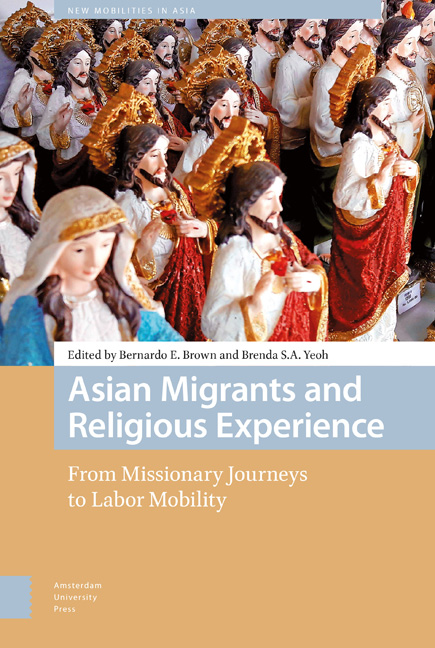Book contents
- Frontmatter
- Contents
- List of Illustrations
- Acknowledgments
- 1 Introduction: Human Mobility as Engine of Religious Change
- Section 1 Mobile Religious Practices
- 2 Saving Yogis: Spiritual Nationalism and the Proselytizing Missions of Global Yoga
- 3 Renewed Flows of Ritual Knowledge and Ritual Affect within Transnational Networks: A Case Study of Three Ritual Events of the Xinghua (Henghua) Communities in Singapore
- 4 Liberalizing the Boundaries: Reconfiguration of Religious Beliefs and Practice amongst Sri Lankan Immigrants in Australia
- Section 2 Transnational Proselytizing
- 5 From Structural Separation to Religious Incorporation: A Case Study of a Transnational Buddhist Group in Shanghai, China
- 6 “10/40 Window”: Naga Missionaries as Spiritual Migrants and the Asian Experience
- 7 Religion, Masculinity, and Transnational Mobility: Migrant Catholic Men and the Politics of Evangelization
- 8 Helping the Wounded as Religious Experience: The Free Burma Rangers in Karen State, Myanmar
- Section 3 Refashioning Religiosity in the Diaspora
- 9 A Multicultural Church: Notes on Sri Lankan Transnational Workers and the Migrant Chaplaincy in Italy
- 10 “Bahala Na Ang Diyos”: The Paradox of Empowerment among Filipino Catholic Migrants in South Korea
- 11 Feeling Hindu: The Devotional Sivaist Esthetic Matrix and the Creation of a Diasporic Hinduism in North Sumatra
- 12 Afterword: What Makes Asian Migrants’ Religious Experience Asian?
- References
- Index
7 - Religion, Masculinity, and Transnational Mobility: Migrant Catholic Men and the Politics of Evangelization
Published online by Cambridge University Press: 12 December 2020
- Frontmatter
- Contents
- List of Illustrations
- Acknowledgments
- 1 Introduction: Human Mobility as Engine of Religious Change
- Section 1 Mobile Religious Practices
- 2 Saving Yogis: Spiritual Nationalism and the Proselytizing Missions of Global Yoga
- 3 Renewed Flows of Ritual Knowledge and Ritual Affect within Transnational Networks: A Case Study of Three Ritual Events of the Xinghua (Henghua) Communities in Singapore
- 4 Liberalizing the Boundaries: Reconfiguration of Religious Beliefs and Practice amongst Sri Lankan Immigrants in Australia
- Section 2 Transnational Proselytizing
- 5 From Structural Separation to Religious Incorporation: A Case Study of a Transnational Buddhist Group in Shanghai, China
- 6 “10/40 Window”: Naga Missionaries as Spiritual Migrants and the Asian Experience
- 7 Religion, Masculinity, and Transnational Mobility: Migrant Catholic Men and the Politics of Evangelization
- 8 Helping the Wounded as Religious Experience: The Free Burma Rangers in Karen State, Myanmar
- Section 3 Refashioning Religiosity in the Diaspora
- 9 A Multicultural Church: Notes on Sri Lankan Transnational Workers and the Migrant Chaplaincy in Italy
- 10 “Bahala Na Ang Diyos”: The Paradox of Empowerment among Filipino Catholic Migrants in South Korea
- 11 Feeling Hindu: The Devotional Sivaist Esthetic Matrix and the Creation of a Diasporic Hinduism in North Sumatra
- 12 Afterword: What Makes Asian Migrants’ Religious Experience Asian?
- References
- Index
Summary
Abstract
This chapter draws from ethnographic research conducted in Rome with Catholic Indian and Filipino men and explores the nexus between religion, masculinity, and transnationalism. It highlights how membership of Italian Catholic congregations allows migrant men to appeal to a more “universalist” morality and to more “legitimate” gendered subjectivities, while also to withdraw from demeaning representations as “ethnic Catholics”. The paper analyses how migrant men who are religiously trained in Italy become agents of re-evangelizations to be sent “back” to Asian countries by Italian Catholic institutions. In the process, transnational mobility does not only mold deep transformations in everyday gendered religiosity, but also indicates ongoing changes in the institutional features of this world religion.
Keywords: masculinity, religion, reformed Catholicism, ethnic churches, Transnationalism
Introduction
This chapter explores the link between gender and migration in the development of religious transnational connections. It focuses on the agentive role of Catholic Indian and Filipino men in building religious enclaves in Italy and promoting evangelical activities in their countries of origin, and in Asia more generally. The analysis responds to the need of furtherdeveloping a more relational approach to gender within global flows and better understanding men's highly heterogeneous involvement in migration (Willis & Yeoh 2000; Hibbins & Pease 2009; Hearn & Blagojević 2013). It does so by focusing on how religion shapes specific understanding of masculinity in the diaspora, while also being transformed in its meanings and practices through migrant men's mobility. The chapter aims at understanding how gendered forms of migration do not only reproduce religious tradition in the diaspora, but also creatively and somehow unpredictably transform religion. It does so by interrogating the ways in which transnational mobility leads migrant men to question religion both at home and in the host society, and to discover new religiously informed models and experiences of their masculinity.
In the last two decades, religion has featured with renewed pervasiveness in a growing literature concerned with migrants’ transnational belonging and minority identity politics in the diaspora (Levitt 2003; Werbner 2002; Smith & Grodz 2014; Allievi & Nielsen 2003; Vertovec 1997).
- Type
- Chapter
- Information
- Asian Migrants and Religious ExperienceFrom Missionary Journeys to Labor Mobility, pp. 177 - 200Publisher: Amsterdam University PressPrint publication year: 2018



